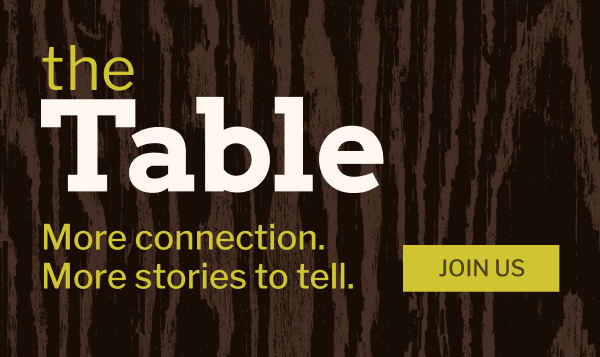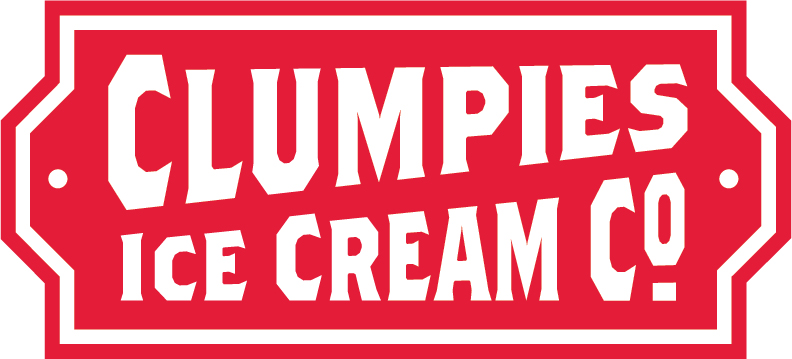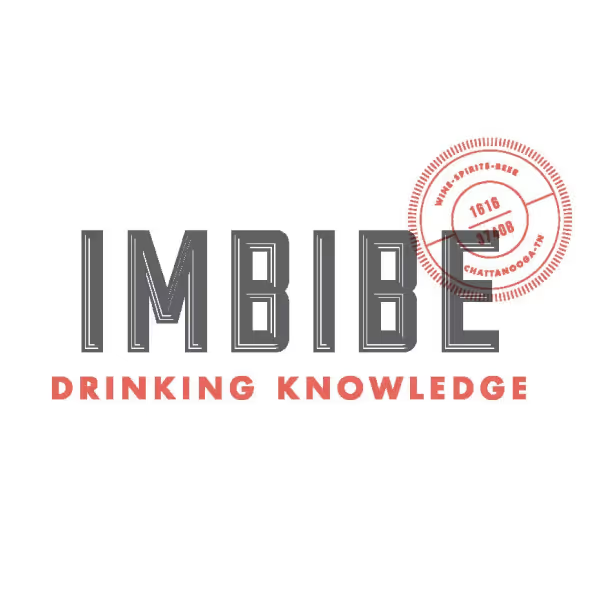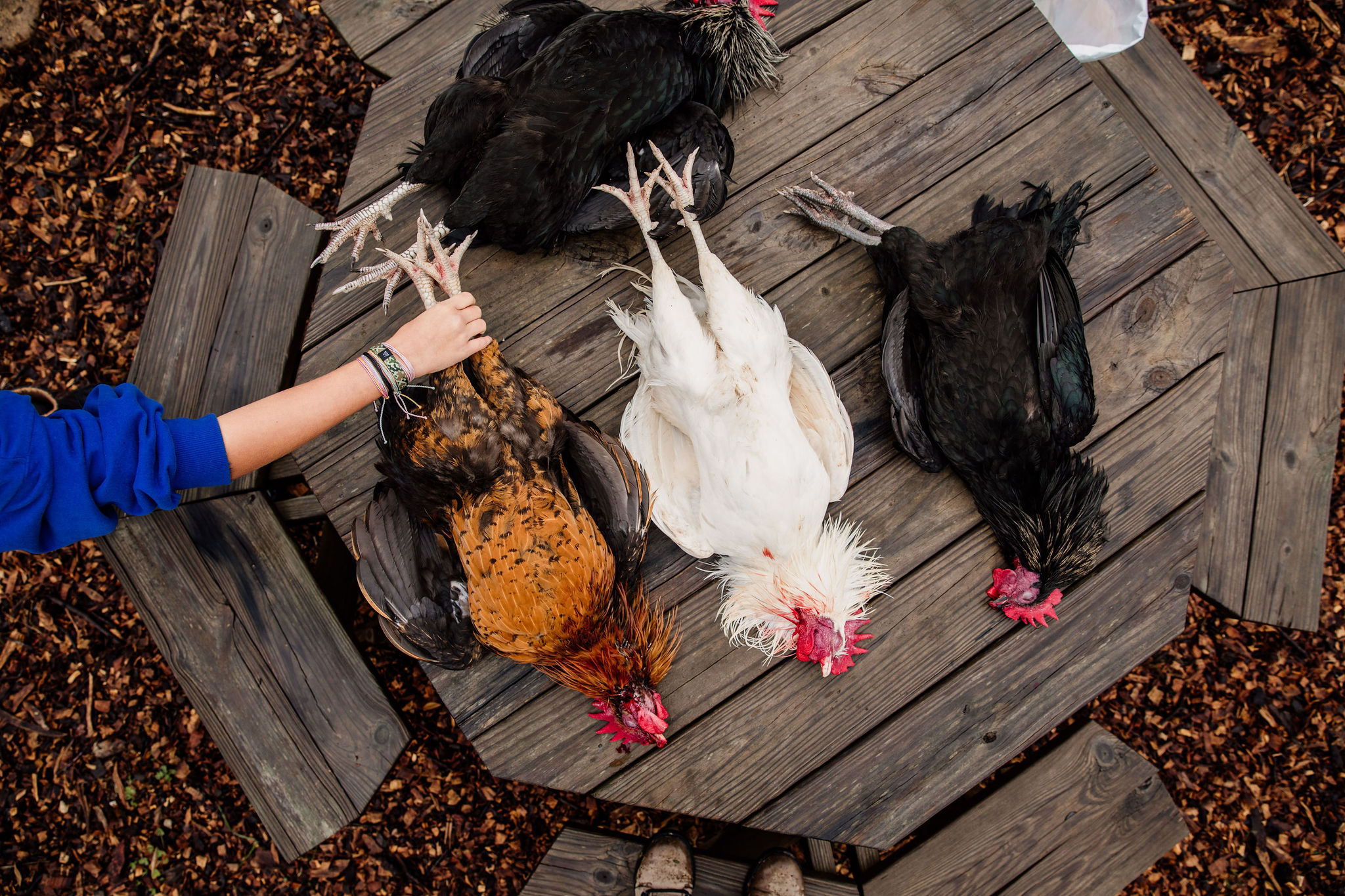
Respect the Full Circle: a Story of Roosters, Knives and Realization
"If you eat meat, you should be able to do this."
Food as a verb thanks
for sponsoring this series

[Note to reader: this story contains images of blood and animal processing. At Food as a Verb, we believe this story also contains images of wholesome respect and powerful education.]
On Monday morning, Amber Gordon's Agriscience class met outside near the rabbit hutches and honeybee hives.
The air was misty and foggy, thanks to an overnight storm.

Eleven students at Ivy Academy — the award-winning charter school near the banks of North Chick Creek in Soddy Daisy — sat around wooden tables, each covered with plastic sheets. Nearly all wore boots.
The students were attentive, respectful and responsive.
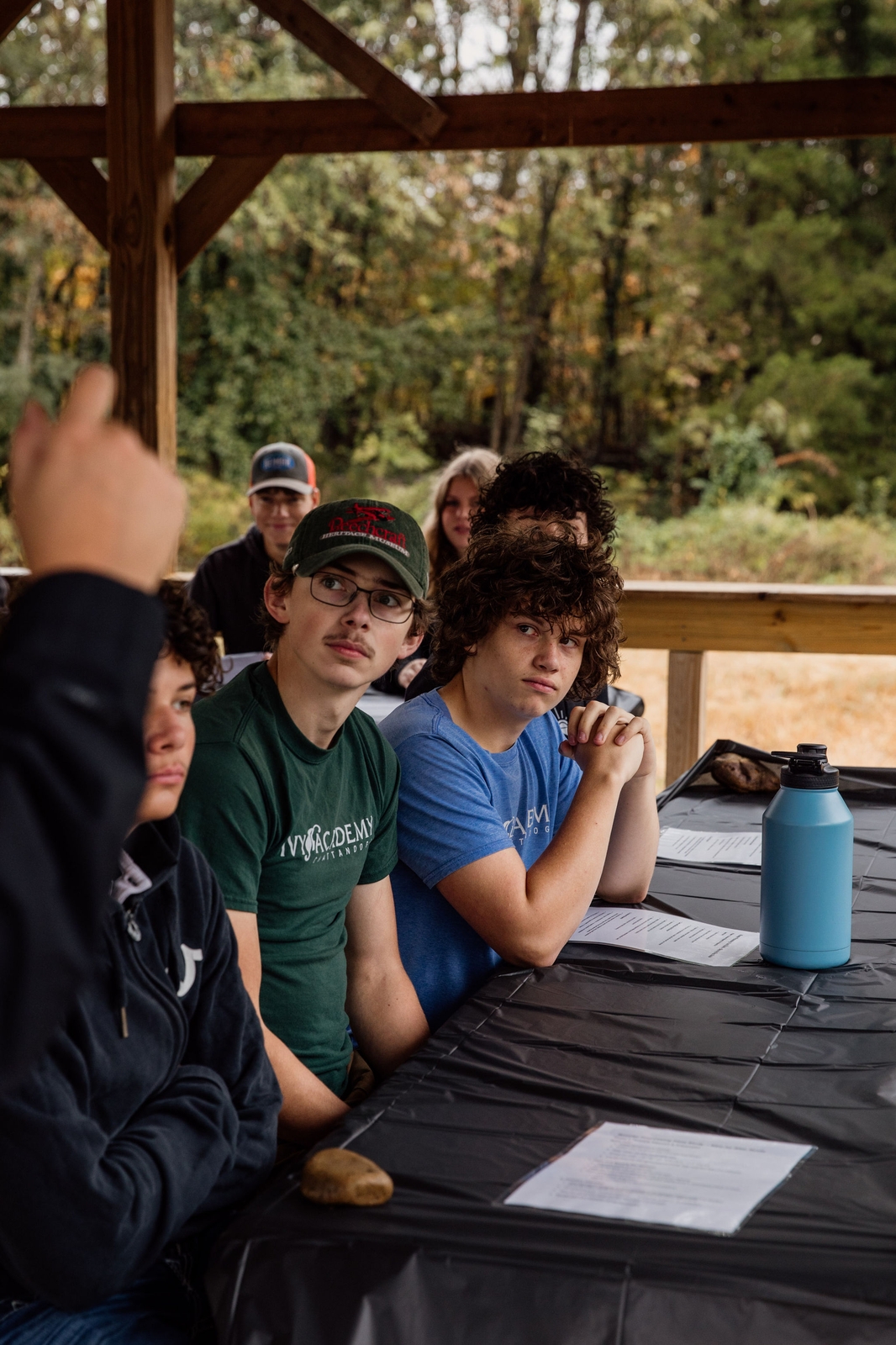
Around them, their tools for the day: printed instructions, big pots for boiling water, cutting boards, twine.
And knives.
In the nearby coop, a rooster crowed.

The night before, there'd been 13 roosters, but Amber had come to school early that morning, wanting to get everything in good order, like any skilled teacher.
She'd talked through it with folks who knew, imagined the moment, watched Youtube videos into the night. When she began processing — "dispatching," as she called it — the first white rooster earlier that morning, before her students arrived, she cried gently.
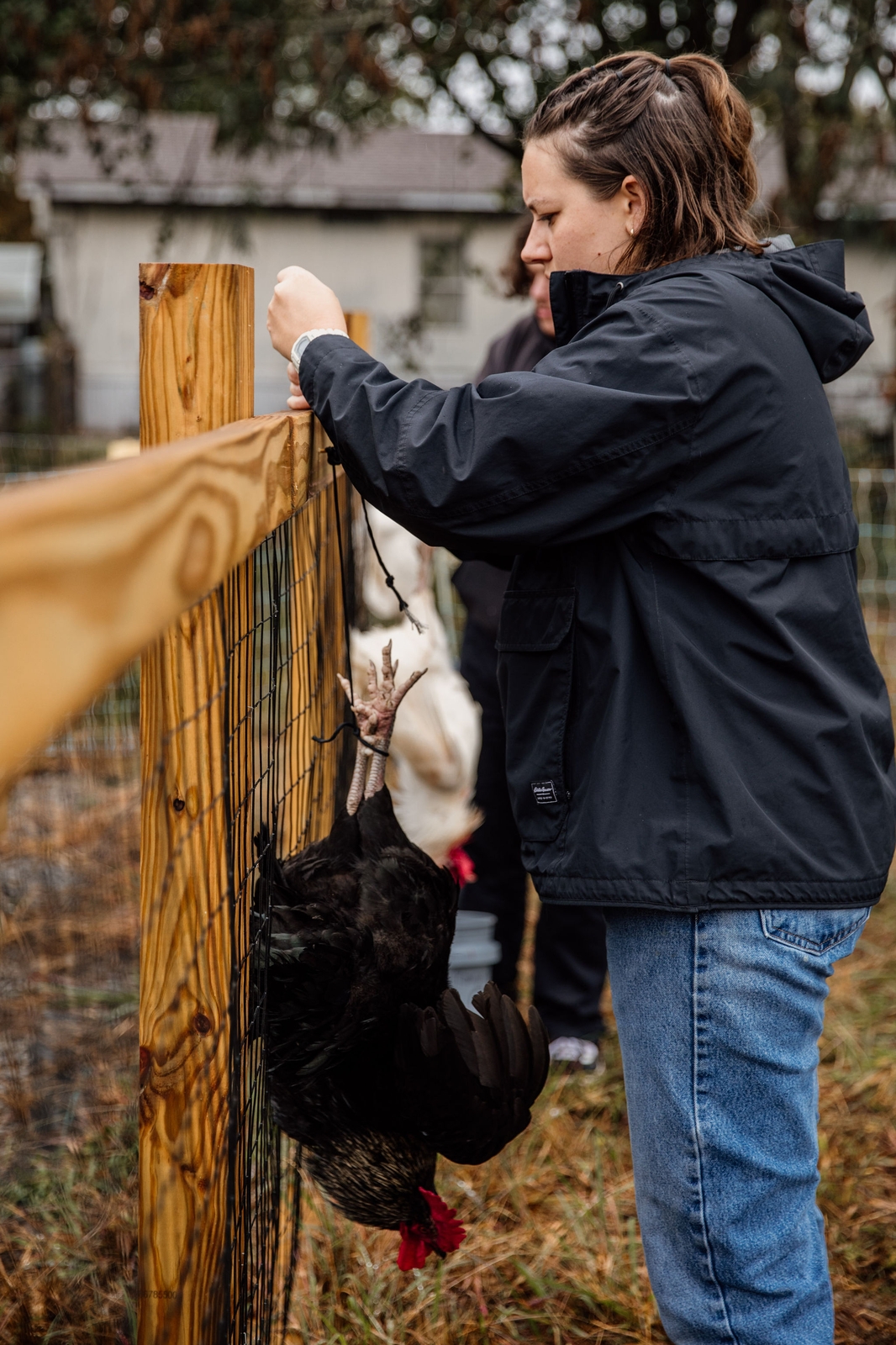
Now, she spoke with her class, the trace of blood on her hands.
"We want to be super respectful," she said. "They've had a really good life."
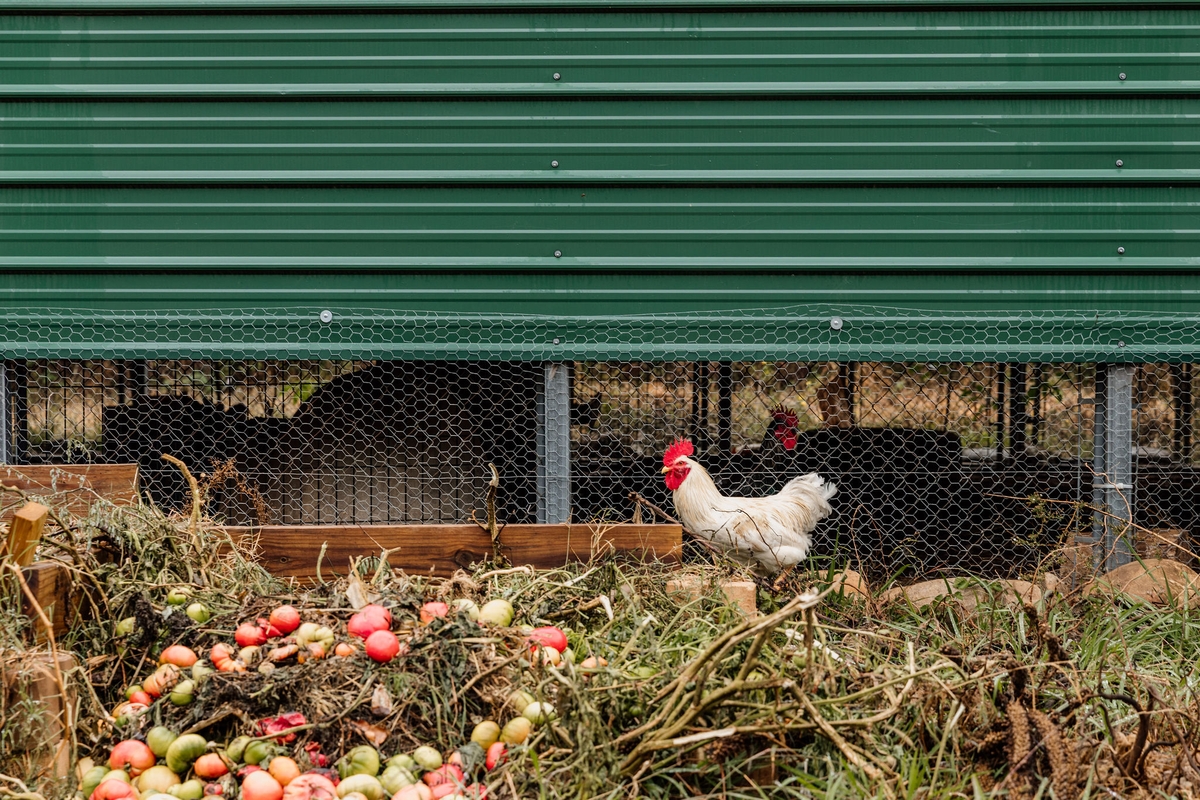
How many of you have done this before?
"A deer," one student said.
"I've filleted a fish," said another.
Sarah and I first heard of this morning several weeks ago; ever since, we've been pinching ourselves: is this really true? Can something so ... honest and real ... happen in a classroom?
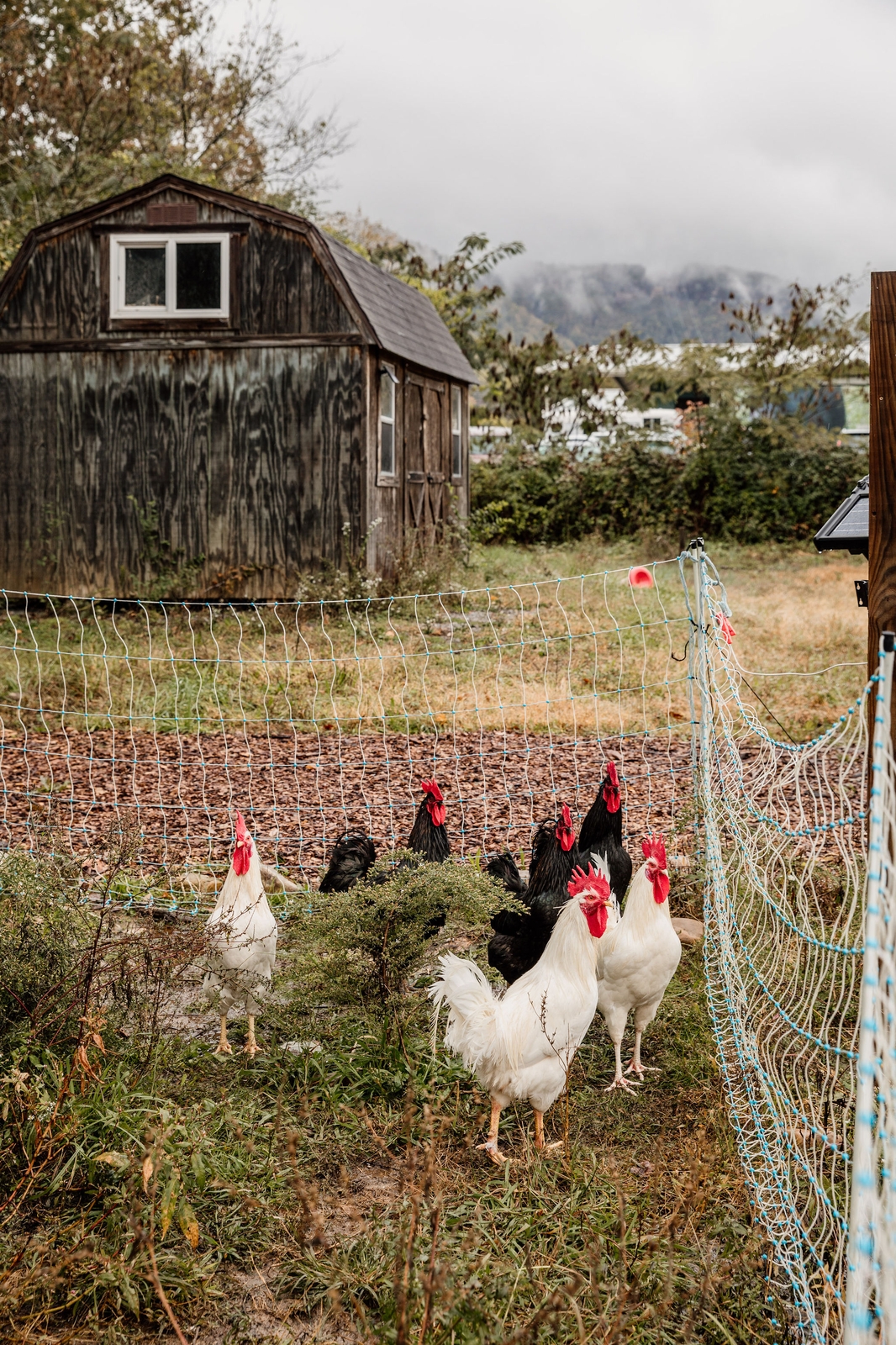
In a world of immense confusion around food and meat, Ivy Academy offered a powerfully clarifying lesson.
On Monday, a dozen students slaughtered a dozen roosters — their hands on the knives, knives at the neck, blood on their Ariat jeans, offering whispered thanks — then invited students from The Howard School's culinary program to help turn those roosters into stocks and broths to take home for the winter.
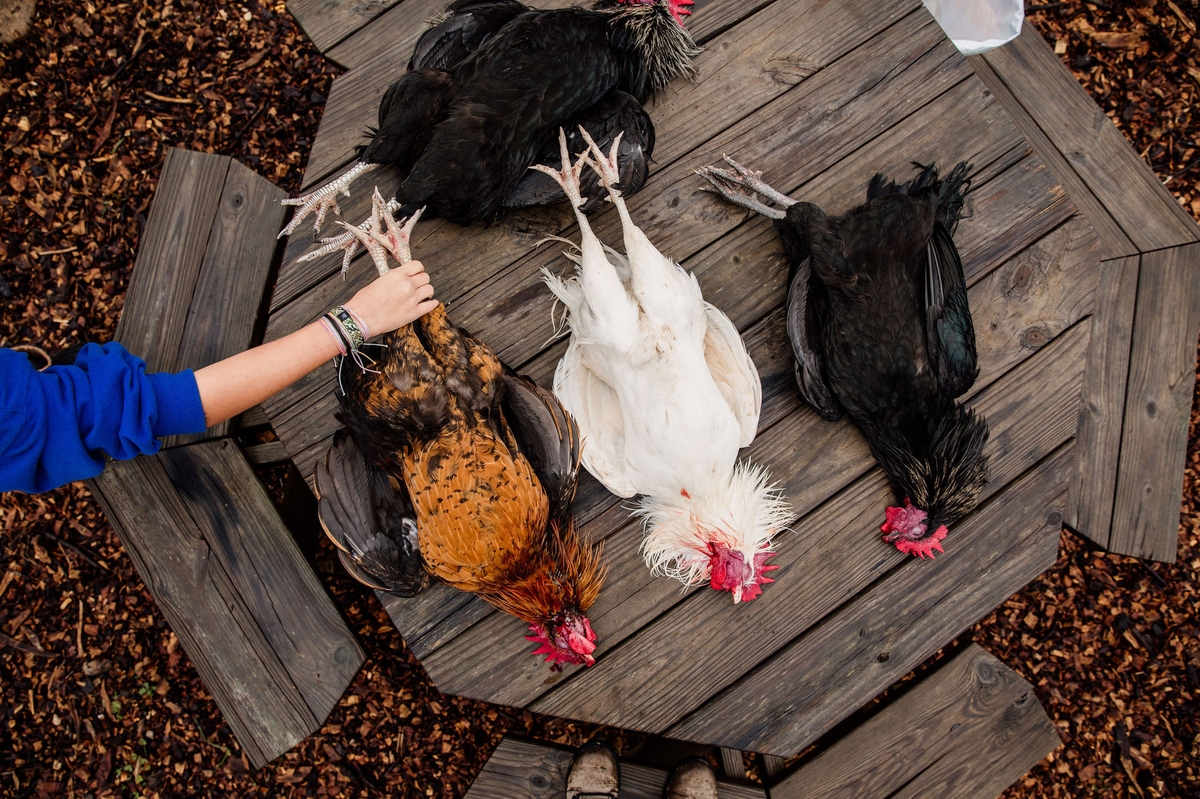
Each day, more than 30 million chickens are slaughtered in the US, according to the USDA. Often, such work remains hidden, secretive and often horrifically cruel.
At Ivy?
Thirteen roosters were processed with immense respect and gratitude in the open air as adults mentored students.
"I'm learning about life," said Titus Vougt, a senior, "and death."

Gone was so much adult fear and micromanaging. Students were trusted to care for one another, handle knives and take life. There were no desks. If students had phones, we never saw them.
Had you landed at Ivy with the sole purpose of judging modern teenagers and their teachers, you would have walked away with a spring in your step: confident, relaxed and thankful for education.
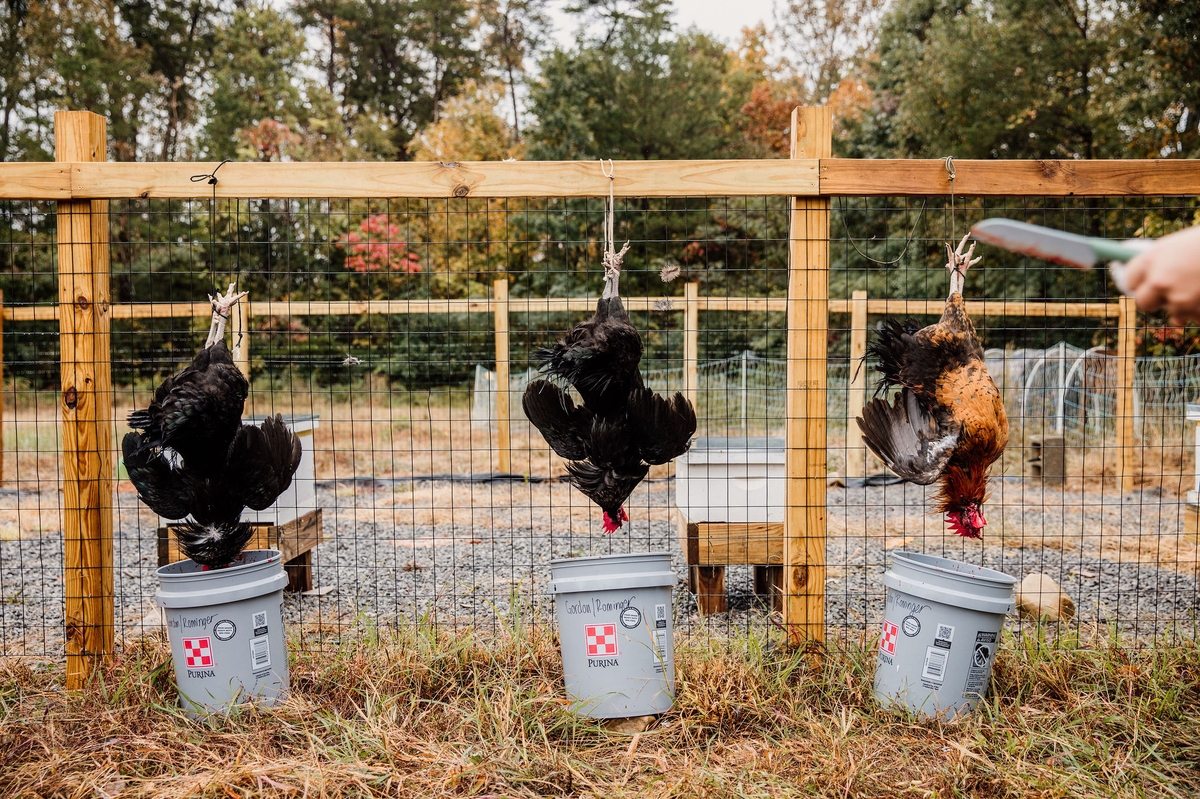
These black, white and brown roosters came from an incubated brood Amber's class hatched last year.
"We don't need this many roosters," she told her students. "Nobody needs this many roosters.
"Their best purpose? Go back to the earth and feed us.
"I want us to have sound intentions and respect the full circle that we talk about in class," she continued.
Now, go get your bird, she told them.
Nothing was required. Jenna Lee chose not to pick up a knife — "I love chicken," she smiled — but still participated in other ways.
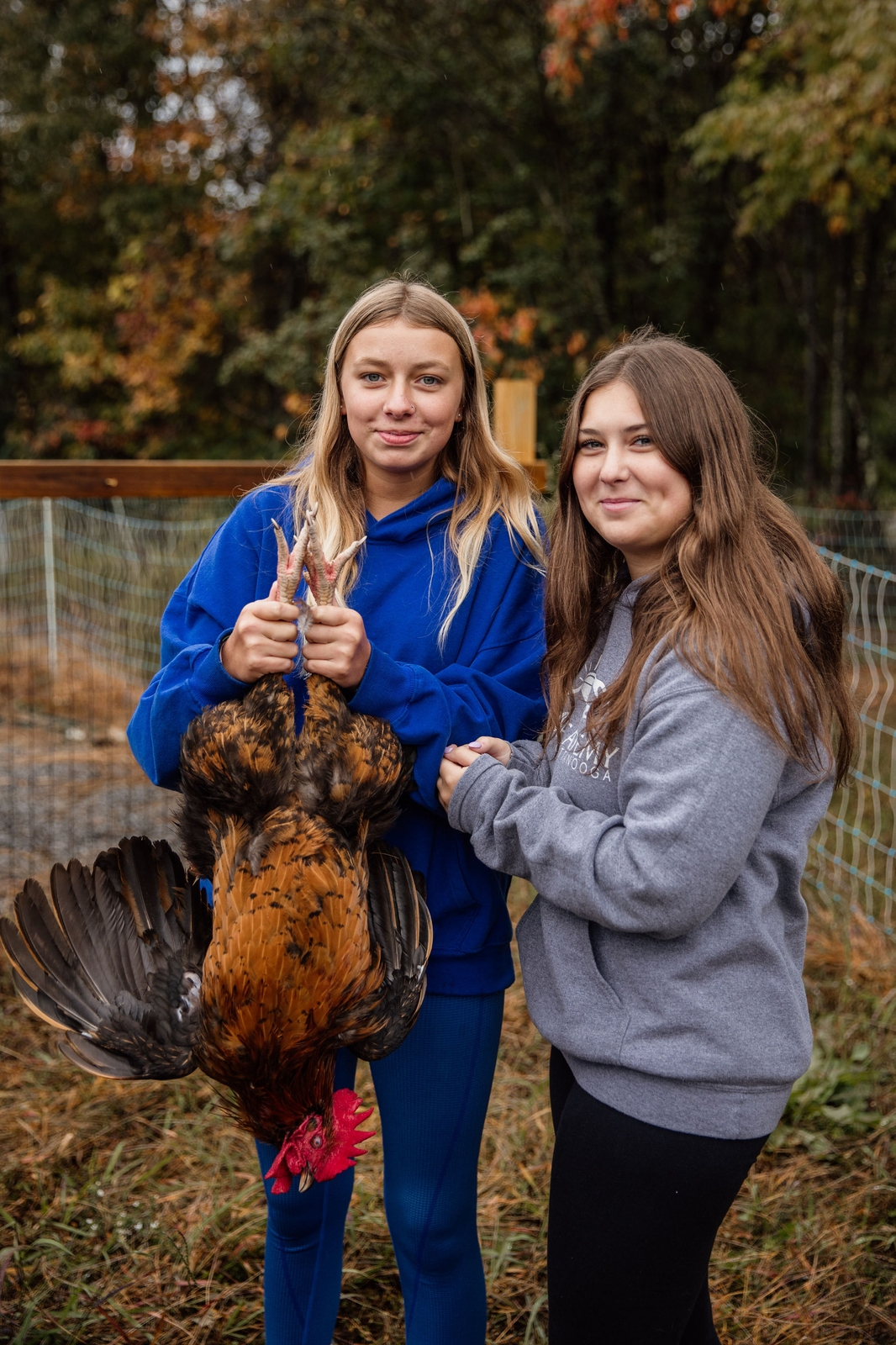
"I want to learn how to process a chicken," said Titus, walking towards the roosters.
Nearby, Oliver Rominger and Cailey Jo Martin began cornering and capturing roosters, one by one.
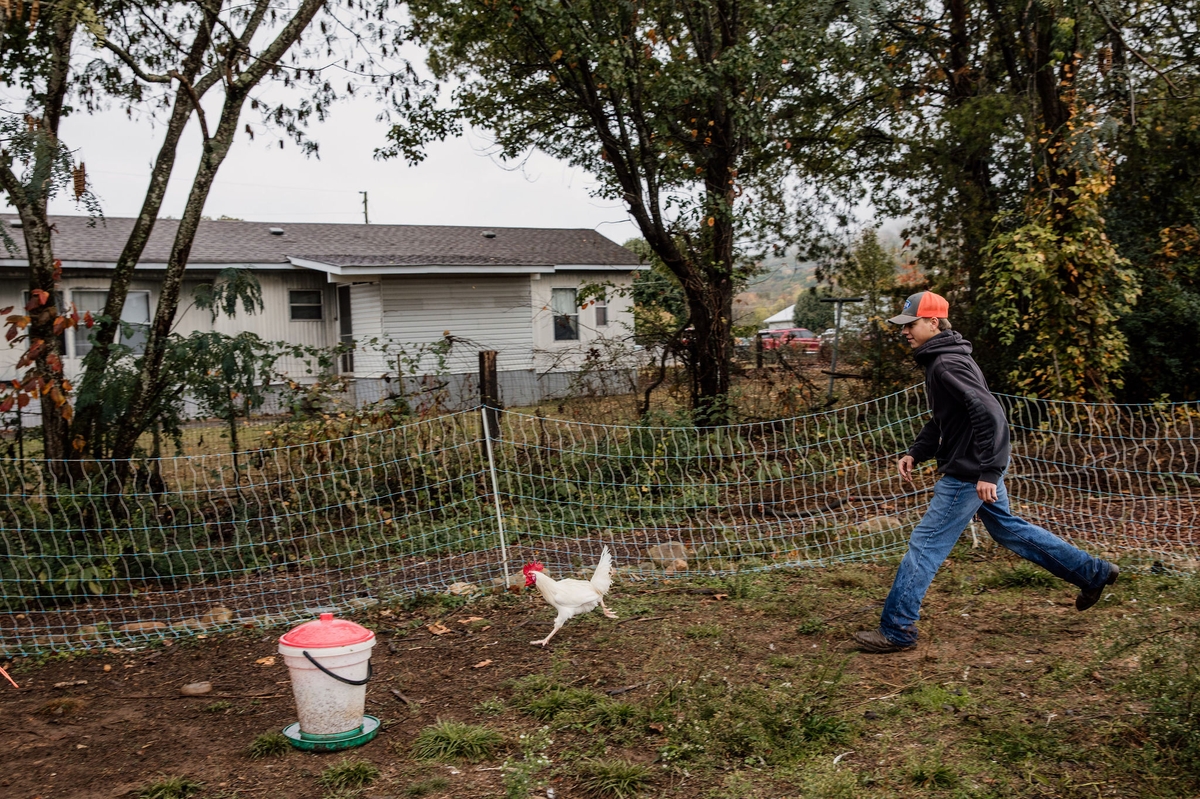
"Agriculture is the path I want to go into," said Cailey Jo, a Future Farmers of America (FFA) member and Ivy student since sixth grade. "I want to have my own farm, dairy and beef."
Has your family farmed before?
"I'll be the first generation," she said.
She moved with a poised confidence, no tenderfoot illusions about the day's work.
"This is a normal part of life," she said.
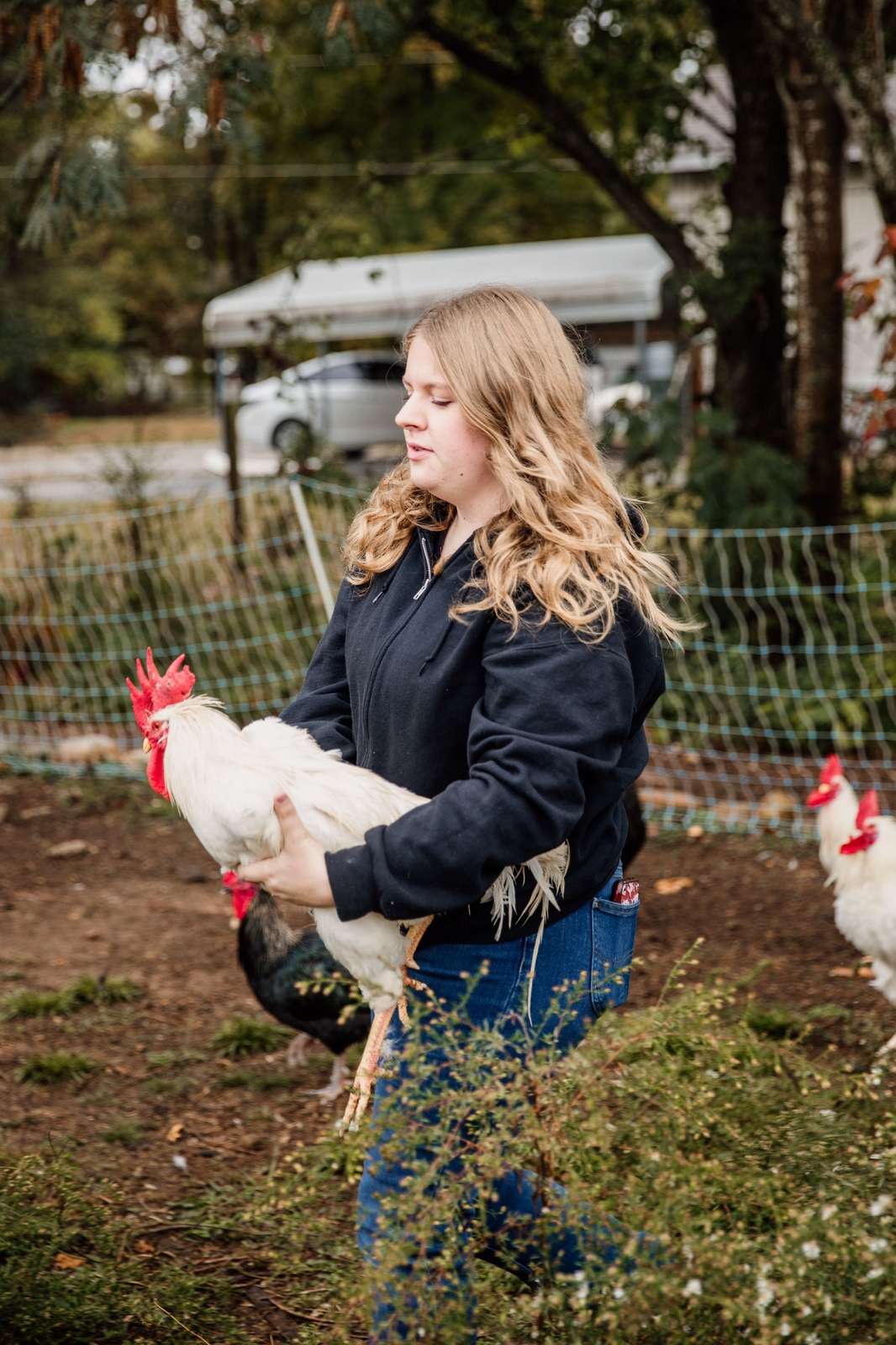
She handed Titus a white bird. Held upside down, the rooster began to relax. Titus strung its feet together, then hung it on a nearby fence.
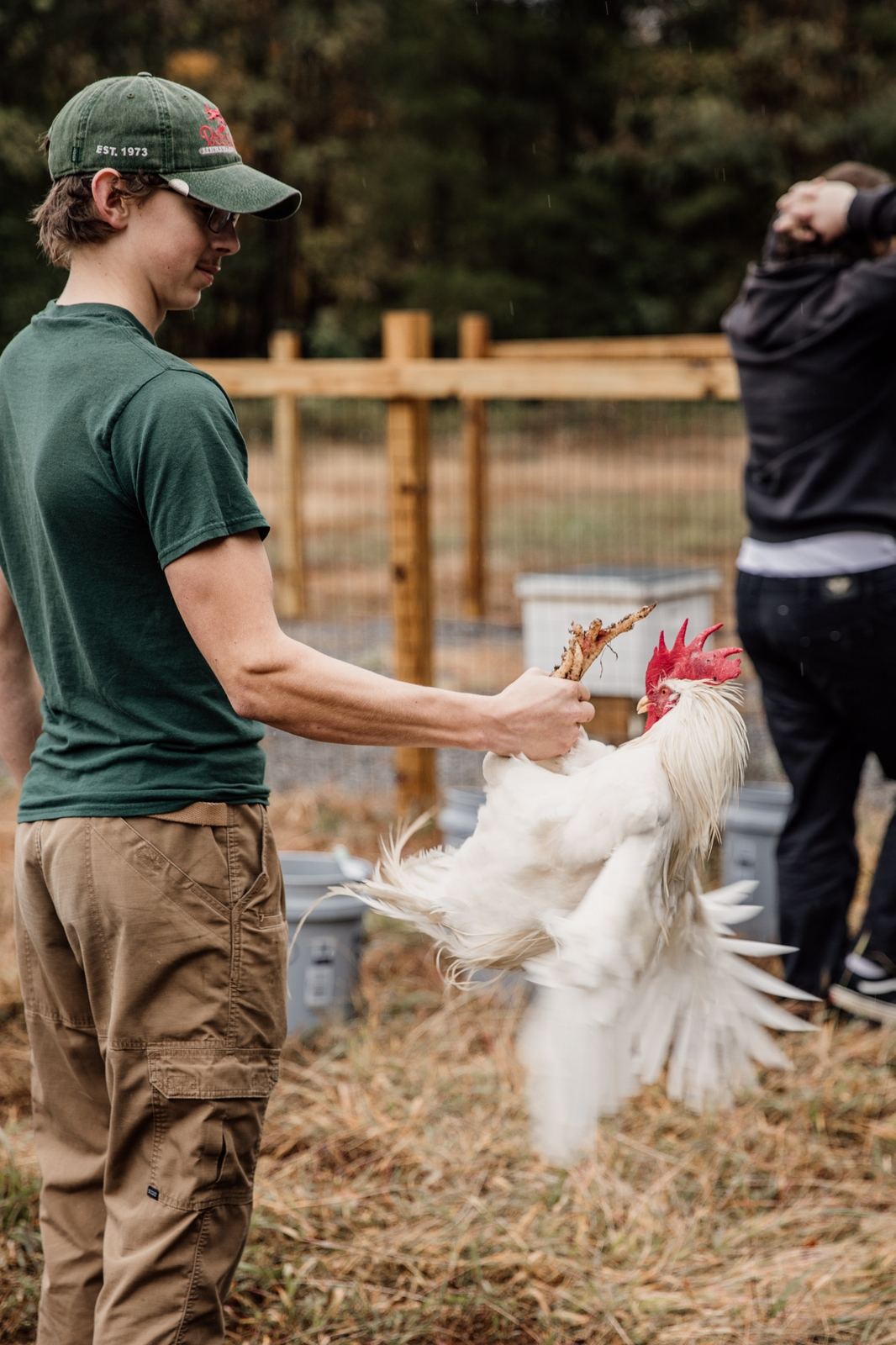
"A swift motion," Amber said. "What we don't want to do is a sawing motion."
Titus was decisive, yet also careful, demonstrating both concern and intention. It would have been alarming to see him horror-film the rooster in one slash; it took him four attempts. On the fourth, the blood began to pour into a grey bucket below.
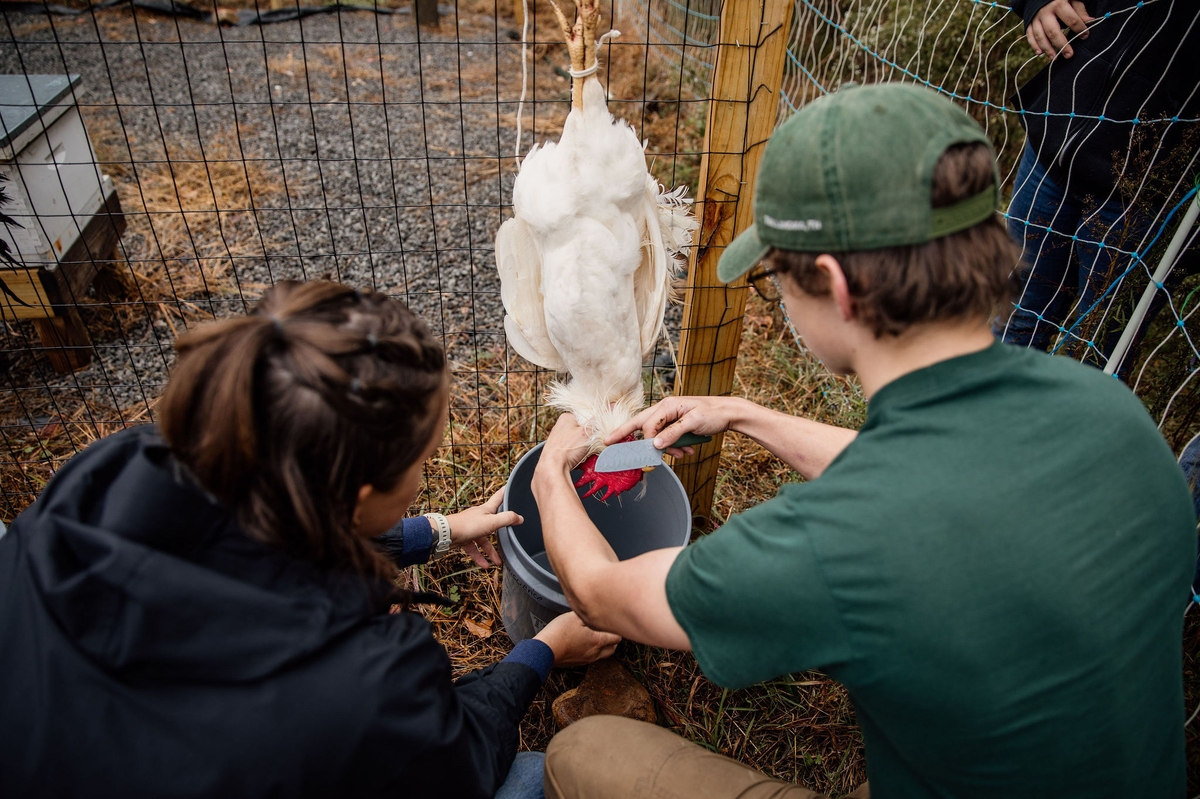
"This is a part of life," said Hayden Danielson, a senior. "This is where your food comes from.
"If you eat meat, you should be able to do this or at least watch the process."
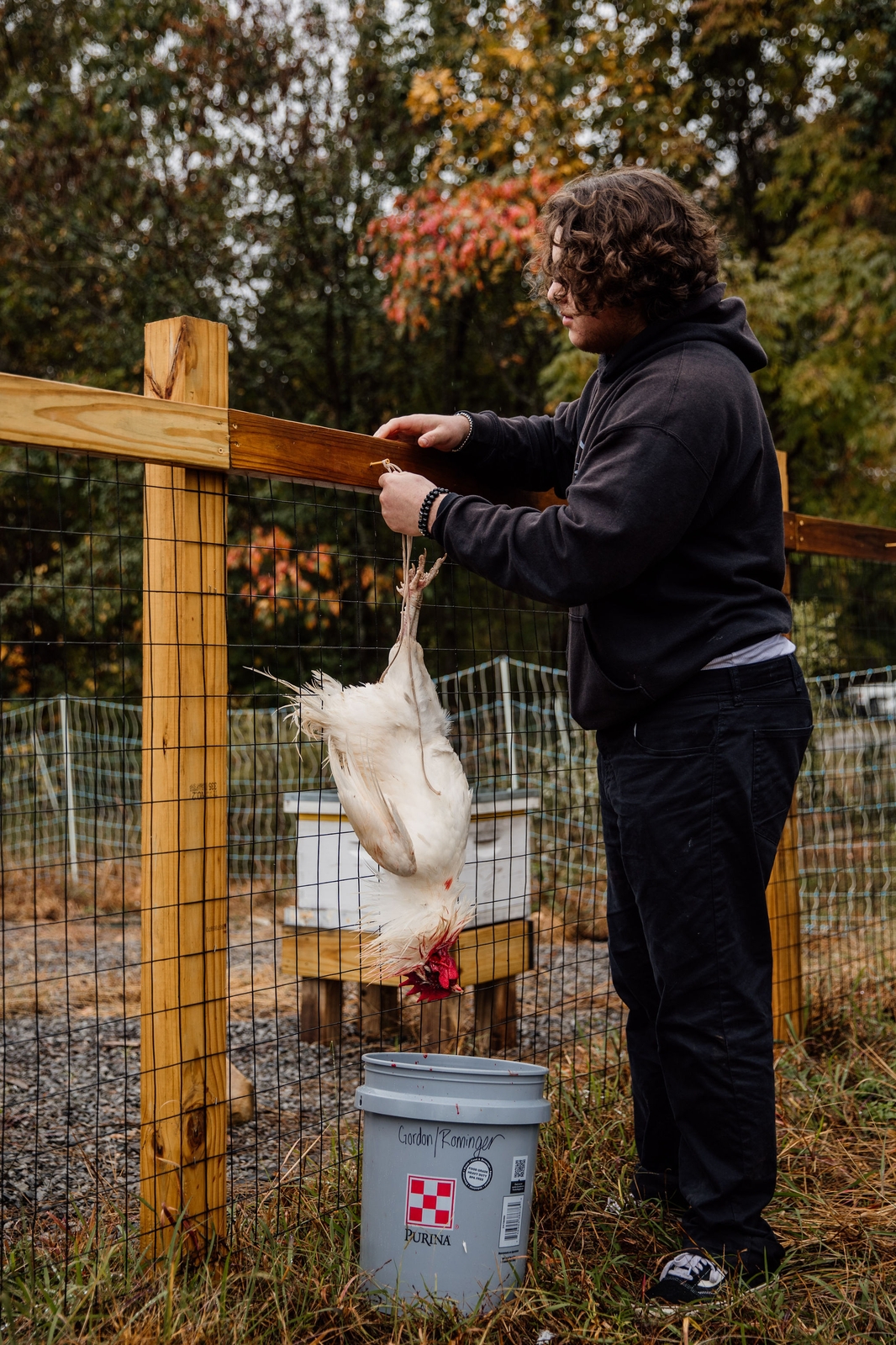
"When I woke up this morning, I was not expecting to do this," said Jonas Lee, a sophomore. He's farming with his grandfather — "it's hard work, but it's how you get food" — tilling fields and what-not.
He looked down at his jeans.
"I got a little blood on me," he said.
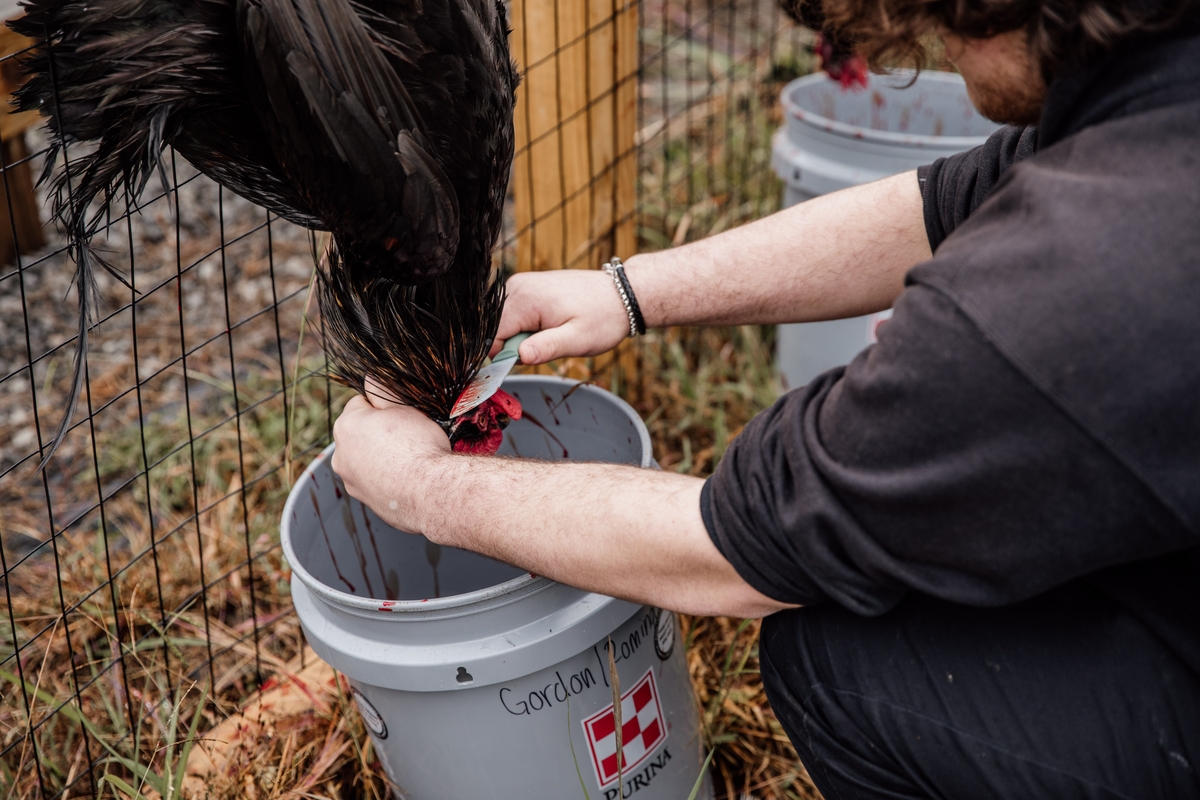
A National Green Ribbon school, Ivy prides itself on experiential education, offering educational professional pathways — agriculture, mechanical, electrical, teaching — for its students.
"We're hands-on," said Chris Holbrook, Ivy's Work-Based Learning and Audio-Visual teacher. "Not just classroom learning."
Students who want to become educators partner with nearby Skillern Elementary, working alongside established teachers there. Ivy's motto: "Scholars. Stewards. Volunteers."
Others build solar panels. Ivy operates a coffeehouse on-site; students learn the business and hospitality industry.
The name?
"School Grounds," Chris said.
Viola. Of course.
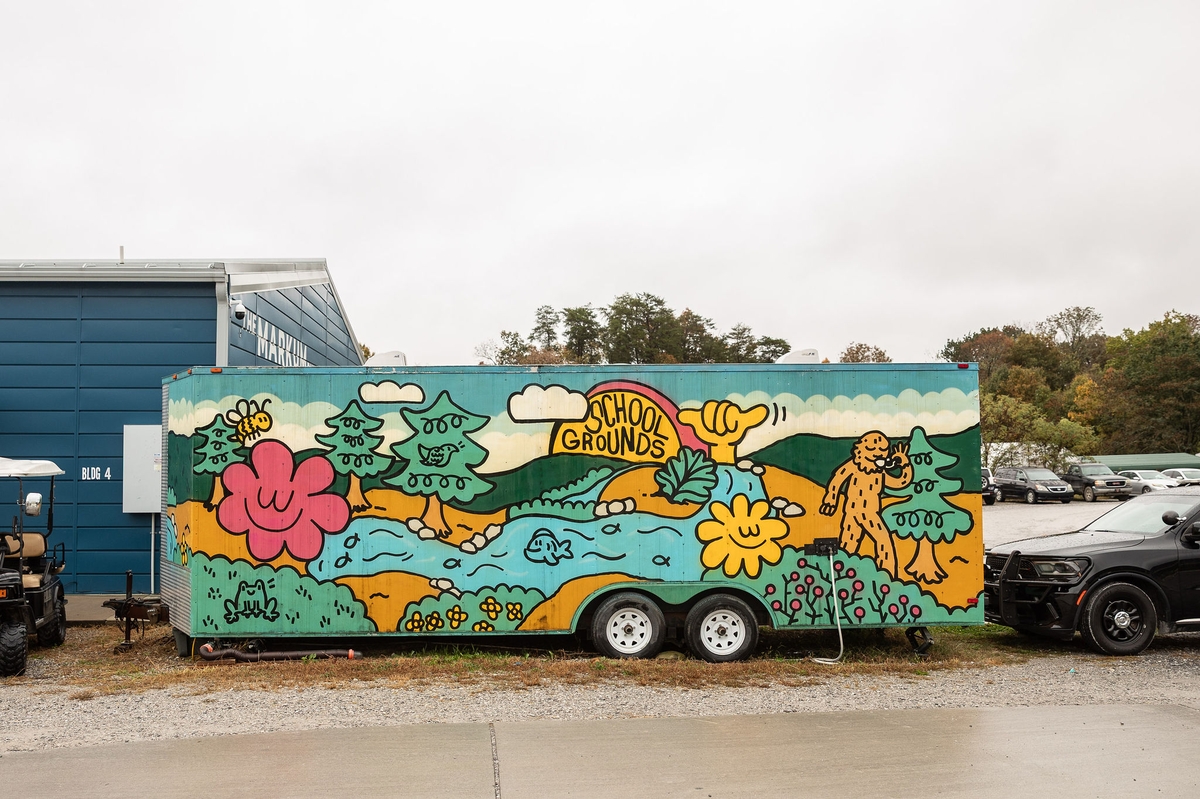
"I love it," said Cailey Jo, echoing what so many others said.
Then, their guests arrived — students from the Culinary Arts program at The Howard School.
The idea came from Amber and Howard's Chef Patrick Kirby. They worked together on a recent conference. She mentioned the excess roosters. He mentioned his culinary students.
Viola. Of course.
"Should I offer this to them?" Cailey Jo asked, then louder, as Howard students approached:
"Do any of you want to cut his throat?"
One Howard student said yes. Jonah guided him through the process.
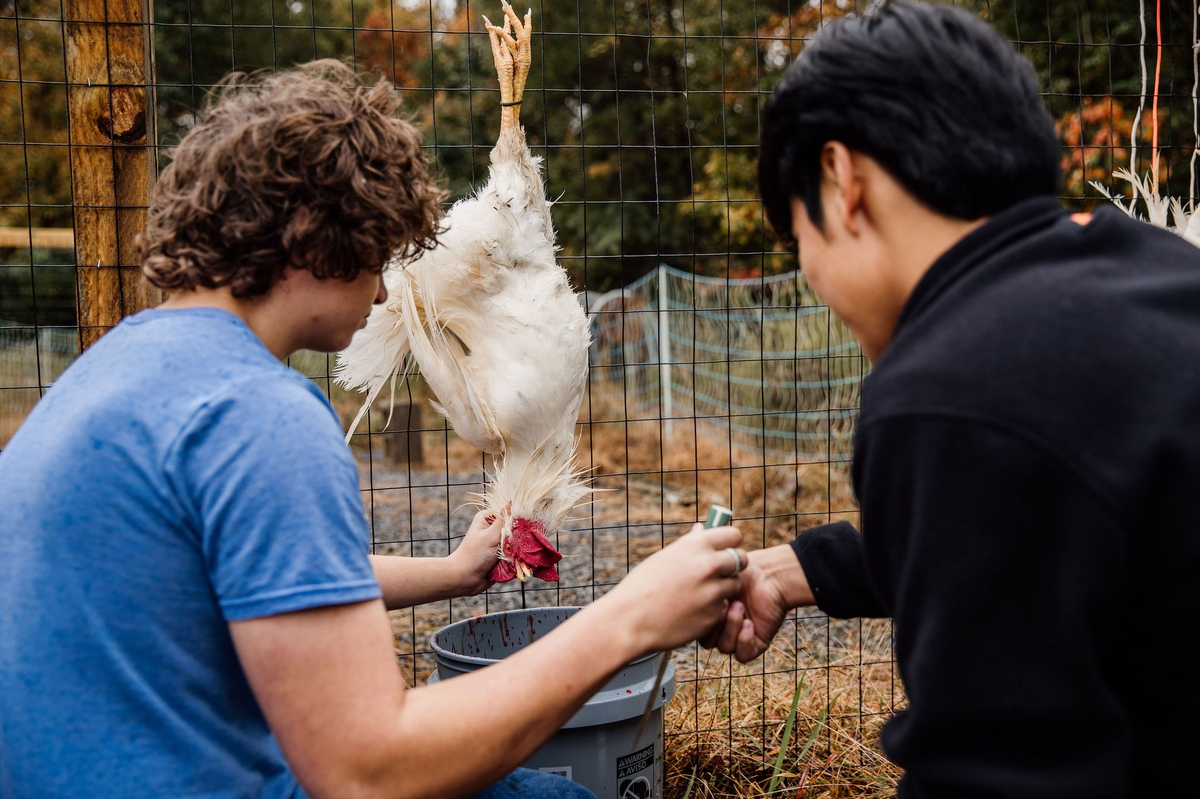
"We want to get people stoked about food in this city and as a profession," said Chef Kirby, whose Culinary Arts program is part of The Howard School's See Rock City Institute of Hospitality and Tourism Management.
"We can create good chefs at a young age."
And every good chef knows broths and stocks.
Nearby, Chris began lighting propane stoves which would heat big pots of water; the slaughtered roosters were submerged, held under with fingertips or an old tree branch, until feathers began to loosen.
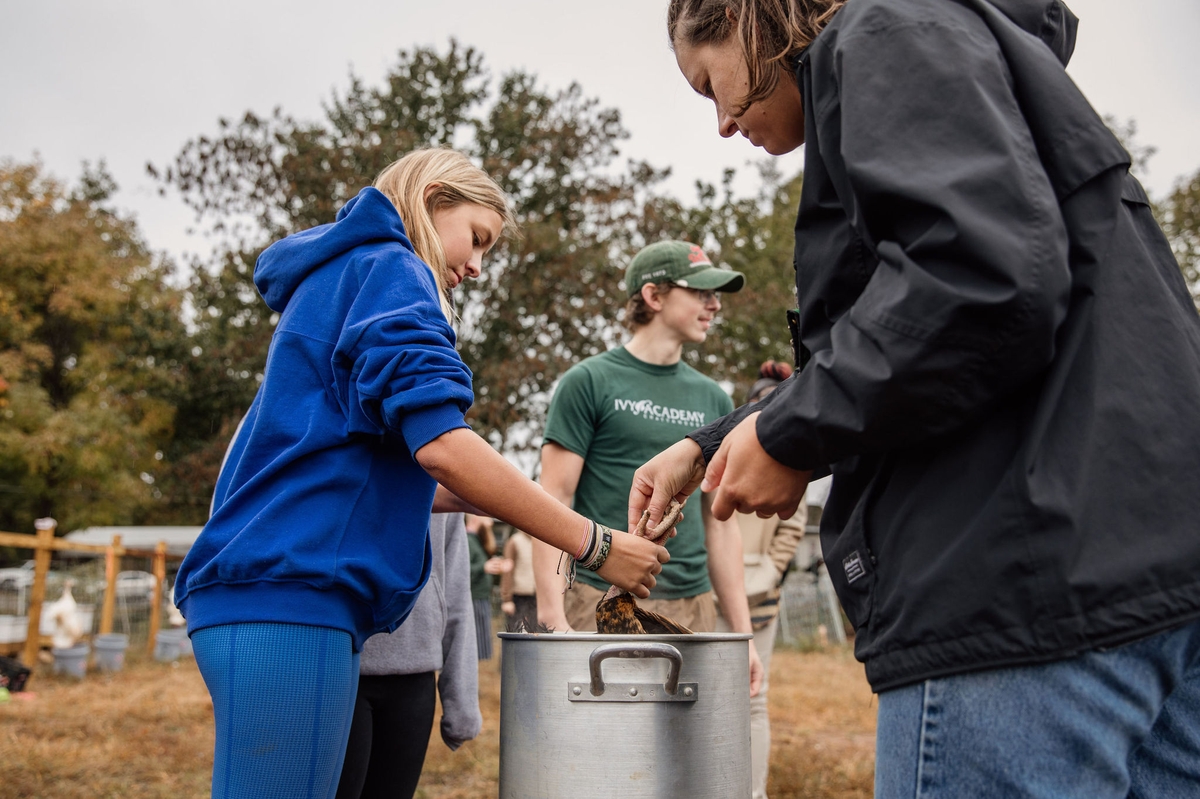
In a blend of city-county fellowship, Ivy and Howard students gathered around the tables and began plucking.
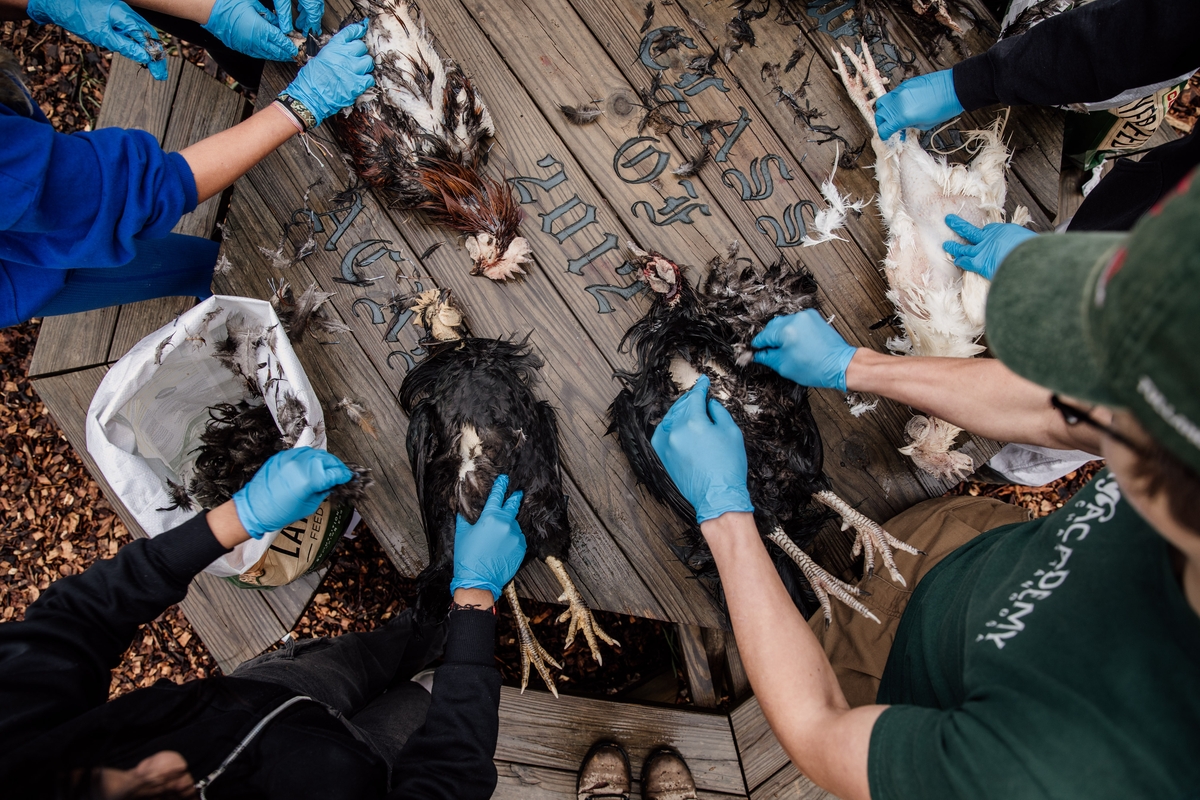
The birds became featherless, the process reflecting the work of good education: uncovering what lies at the heart of things.
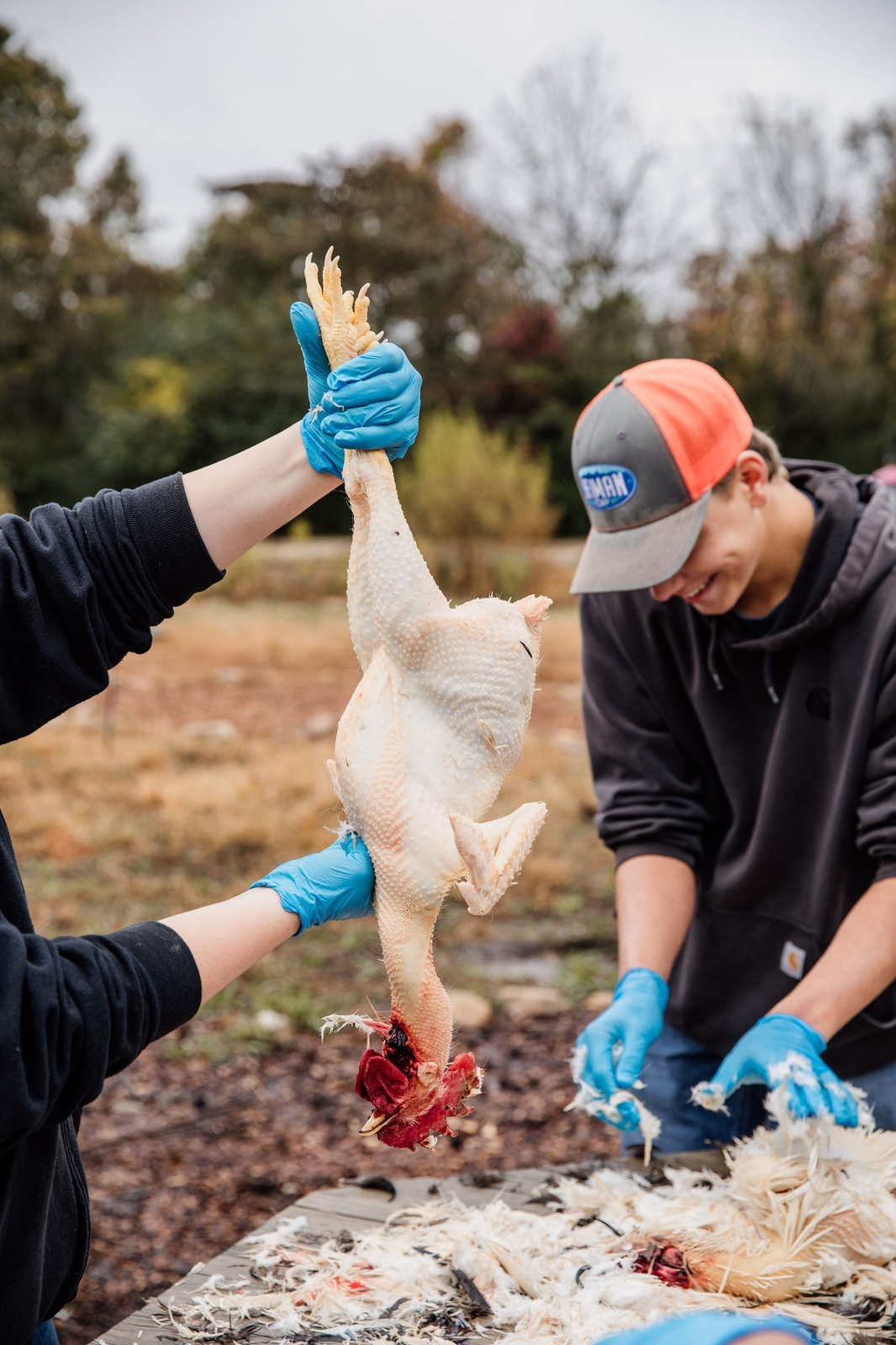
Then, plucked birds were carried to tables where the processing began. Chef Kirby brought out white and yellow cutting boards and kitchen knives. Ayla Rominger got to work.
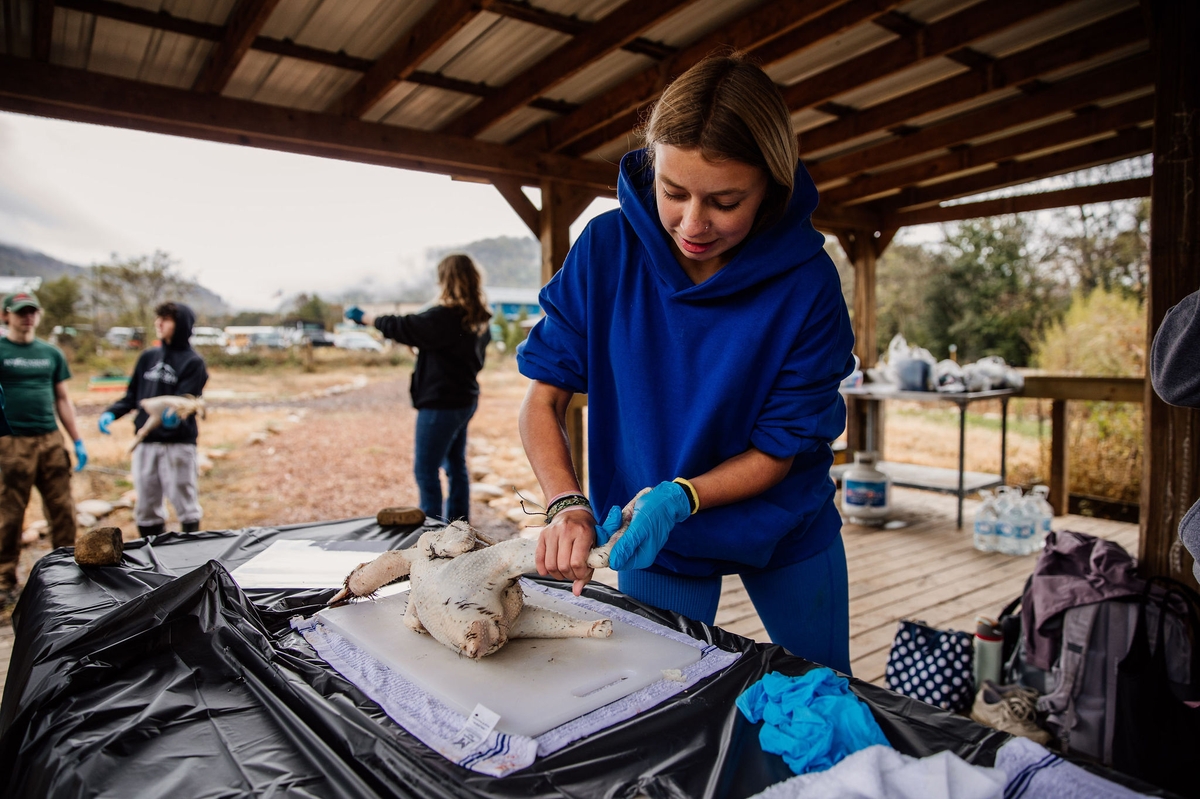
As students worked, it began to feel like a campfire of sorts, as stories and tall tales and laughter emerged.
Once, a raccoon was caught on campus and an Ivy teacher butchered and served it for lunch.
Once, a student's grandparents grabbed a coyote they thought was roadkill, but turned out to be alive and well in the backseat.
Chef Kirby talked of his grandparents from Ireland, who owned dairy goats and sheep.
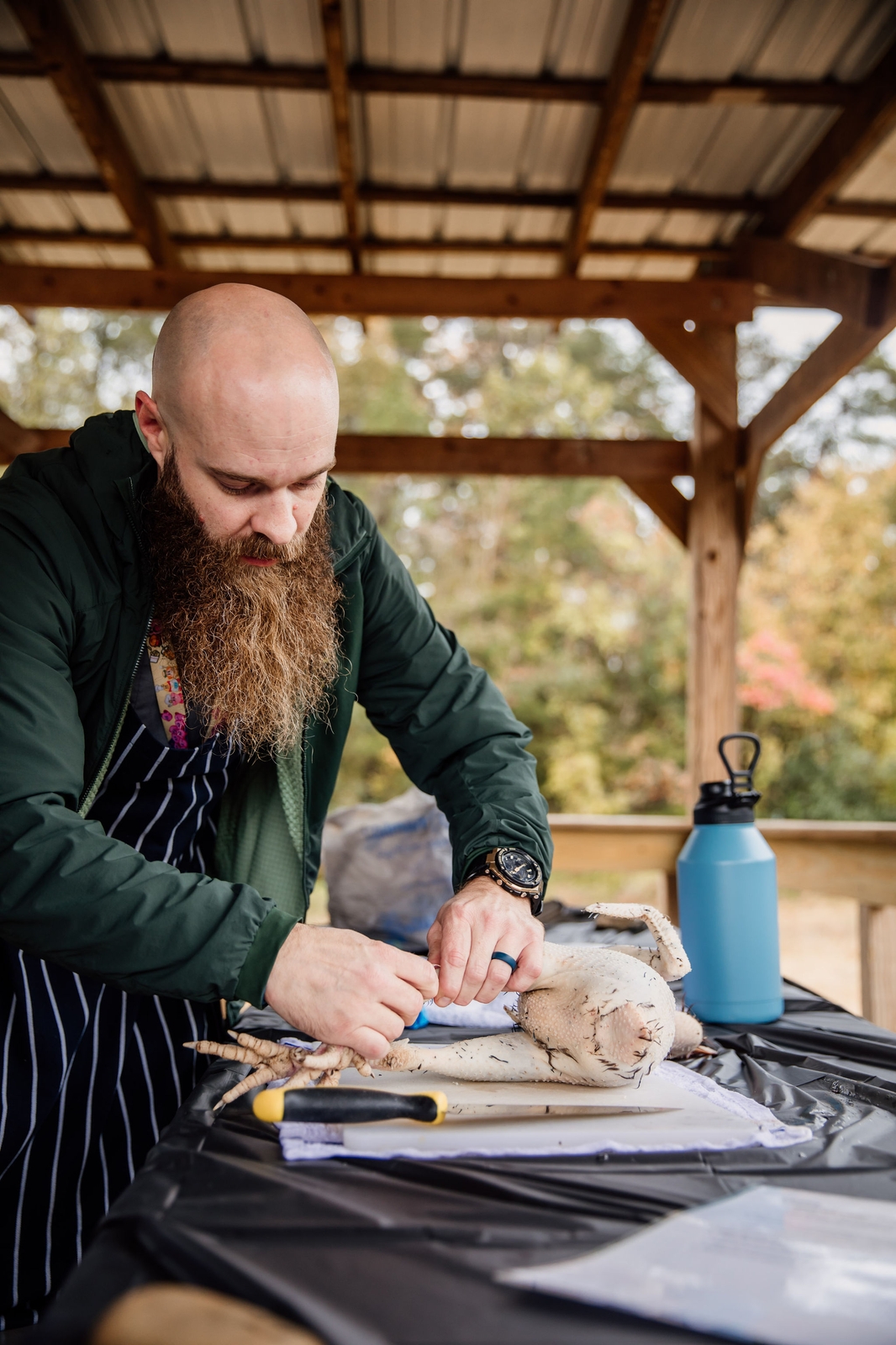
Amber helped Noah Helmle, an exchange student from Germany, who then helped Titus.
"If you eat meat, you should be able to butcher the meat," said Noah.
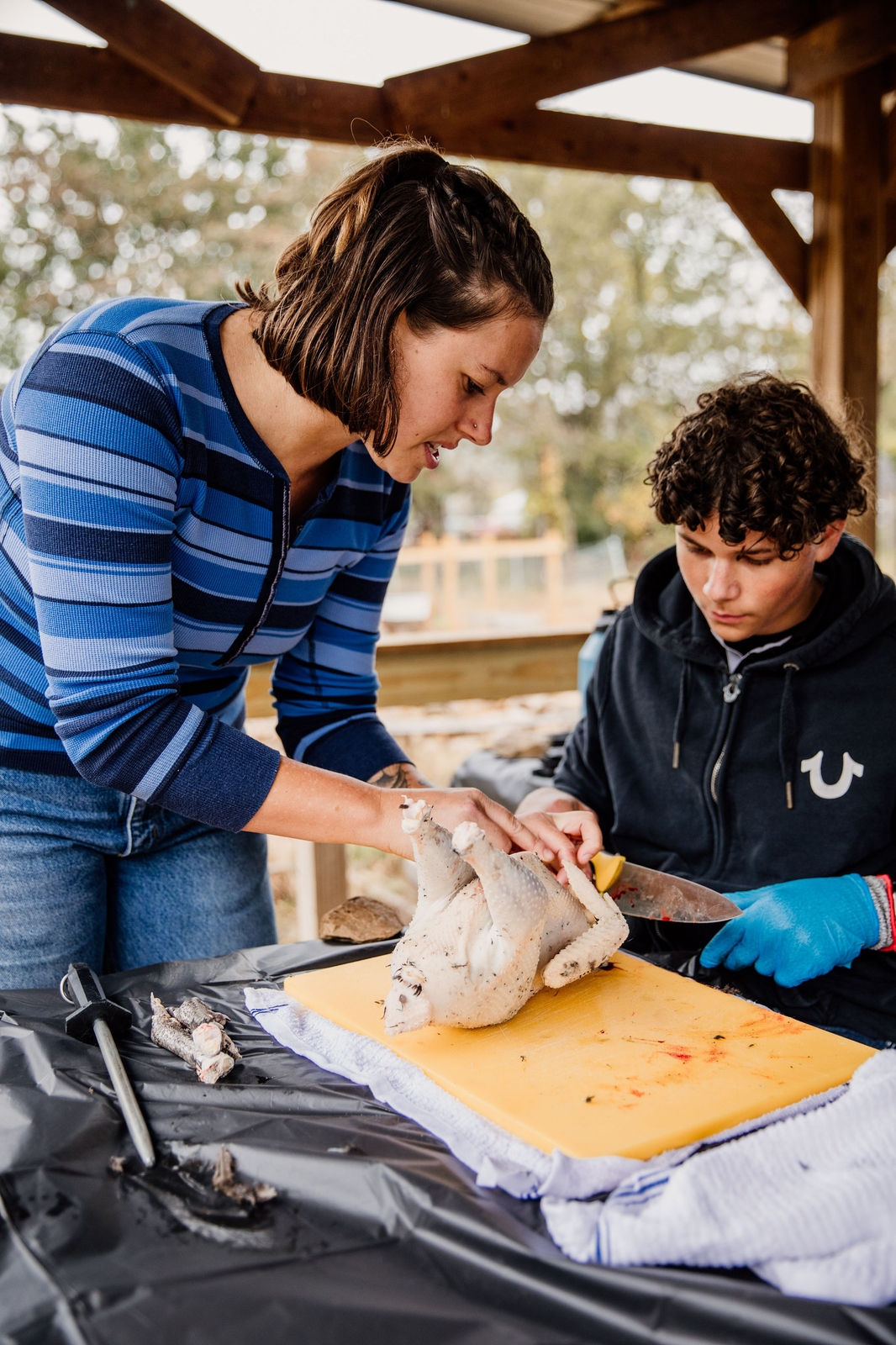
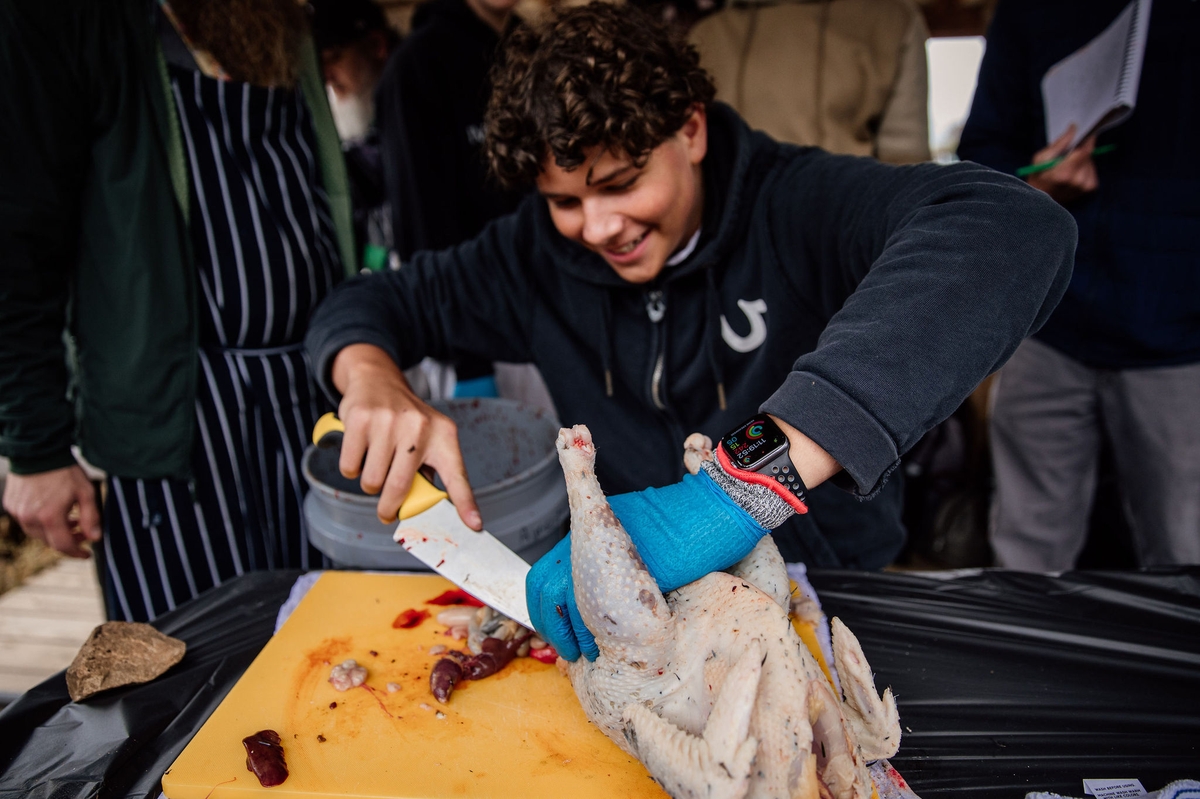
They found the gizzard, liver, heart. They pulled out the innards. Somebody joked about the box on Jimmy Fallon: you put your hand in, but can't see what's inside.
"Where's our biology class?" one student laughed.
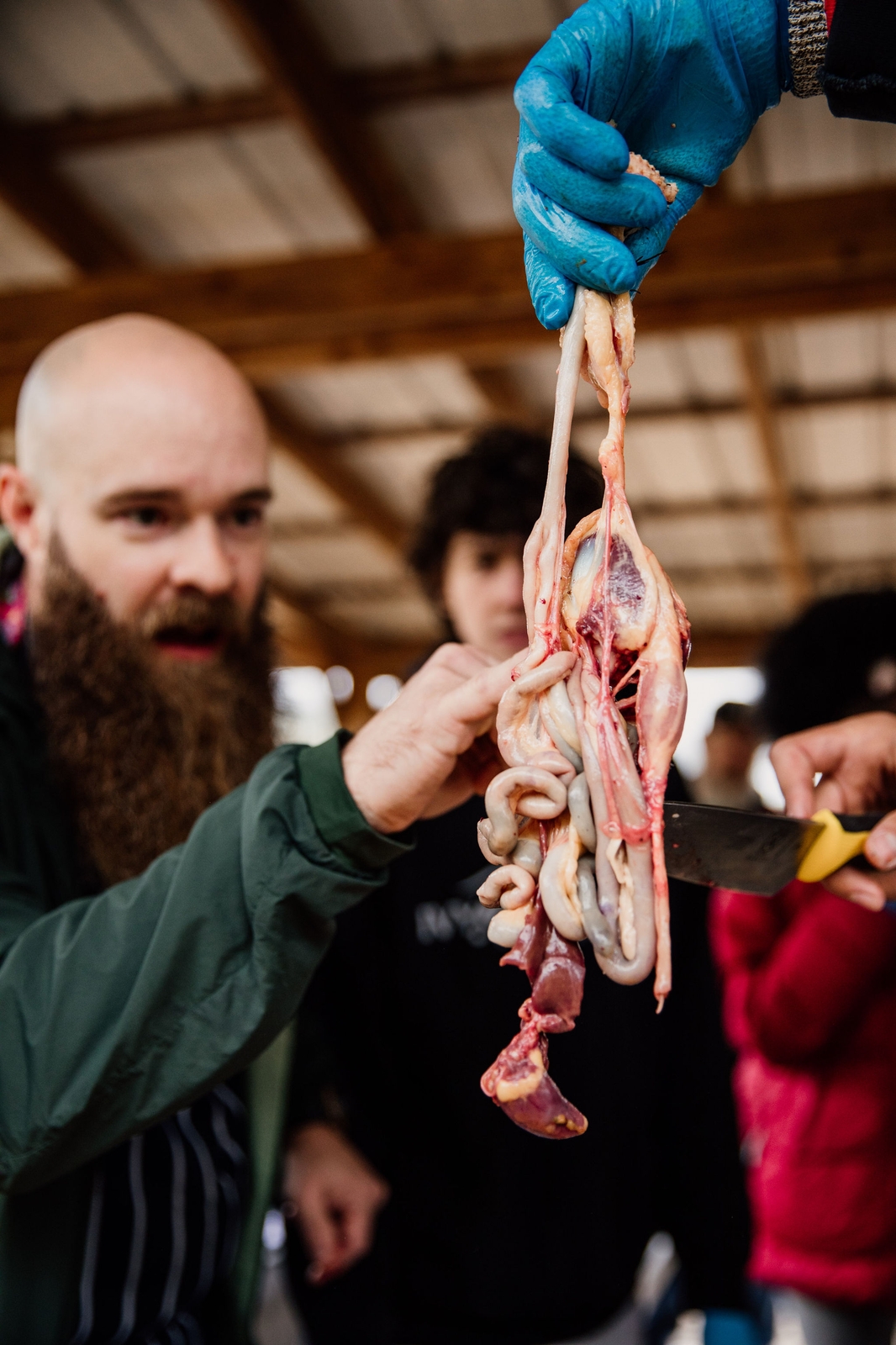
Earlier that day, Cailey Jo — FFA member, first generation farmer — had just killed her rooster. For her, it was a present-tense moment, thinking to herself — I'm killing it now — as the knife did its work. She noticed the weight of the bird shifting as it died, all of it adding up.
"You realize what you're doing," she said.
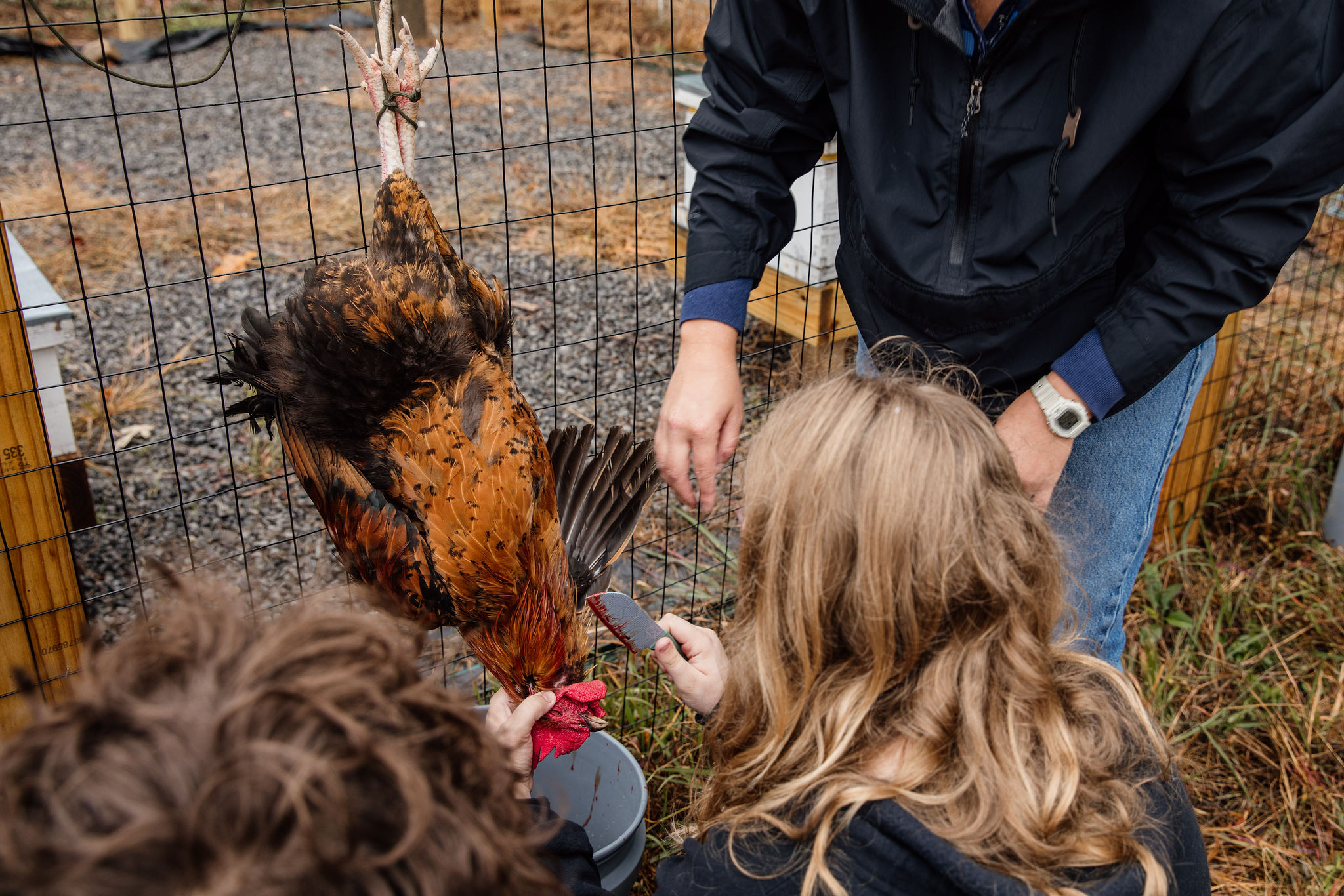
Isn't this the true goal of education? To pull back the curtains on the human experience?
To see clearly — to realize what we're doing — so that our lives and actions in the world emerge from sober clarity and respect, not a confused recklessness?

"I'm so grateful we had this opportunity," said Titus. "Thank you, chicken."
Thank you, Ivy.
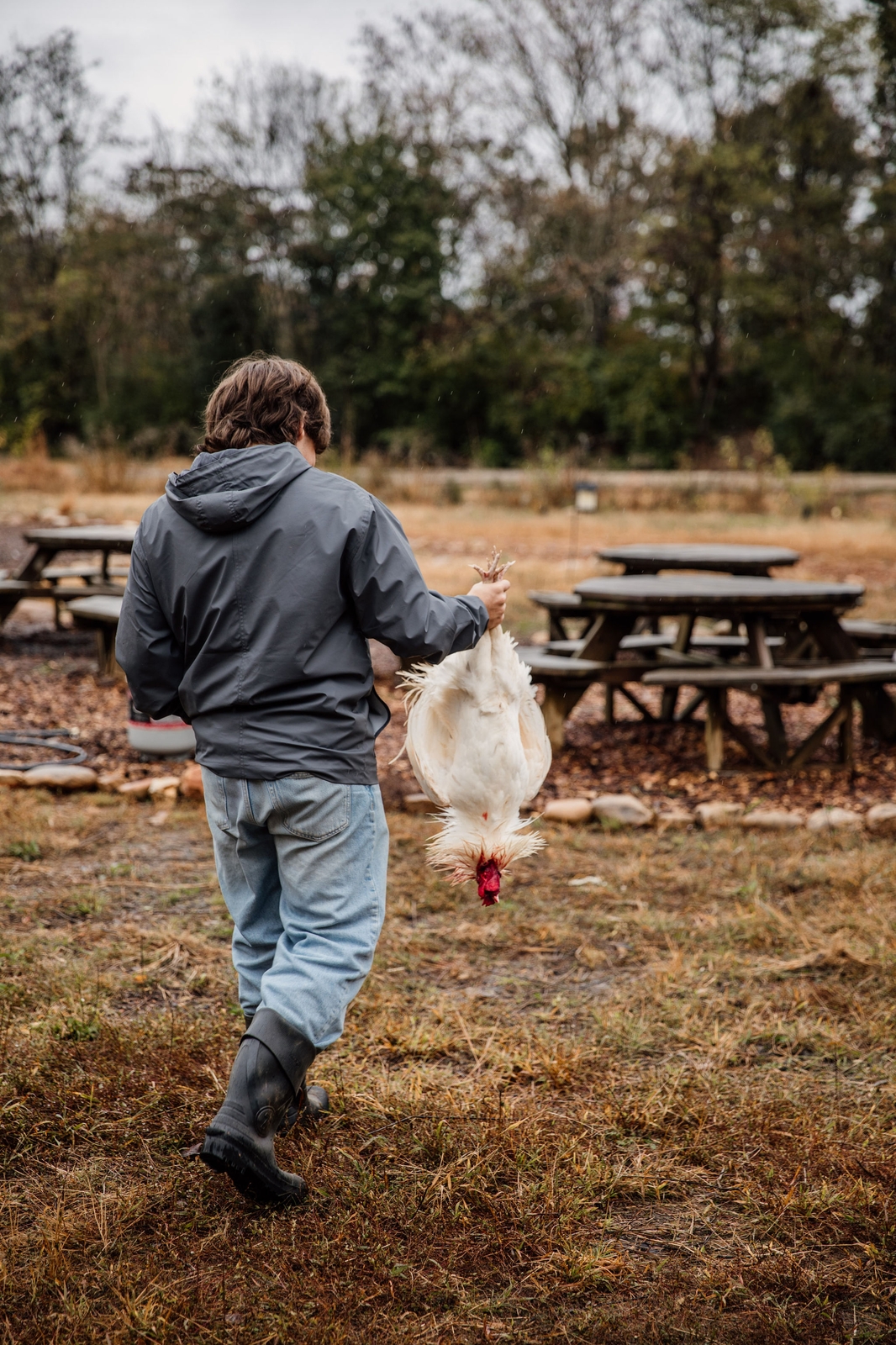
Story ideas, questions, feedback? Interested in partnering with us? Email: david@foodasaverb.com
This story is 100% human generated; no AI chatbot was used in the creation of this content.
food as a verb thanks our sustaining partner:
food as a verb thanks our story sponsor:
Reflection Riding

[Note to reader: this story contains images of blood and animal processing. At Food as a Verb, we believe this story also contains images of wholesome respect and powerful education.]
On Monday morning, Amber Gordon's Agriscience class met outside near the rabbit hutches and honeybee hives.
The air was misty and foggy, thanks to an overnight storm.

Eleven students at Ivy Academy — the award-winning charter school near the banks of North Chick Creek in Soddy Daisy — sat around wooden tables, each covered with plastic sheets. Nearly all wore boots.
The students were attentive, respectful and responsive.

Around them, their tools for the day: printed instructions, big pots for boiling water, cutting boards, twine.
And knives.
In the nearby coop, a rooster crowed.

The night before, there'd been 13 roosters, but Amber had come to school early that morning, wanting to get everything in good order, like any skilled teacher.
She'd talked through it with folks who knew, imagined the moment, watched Youtube videos into the night. When she began processing — "dispatching," as she called it — the first white rooster earlier that morning, before her students arrived, she cried gently.

Now, she spoke with her class, the trace of blood on her hands.
"We want to be super respectful," she said. "They've had a really good life."

How many of you have done this before?
"A deer," one student said.
"I've filleted a fish," said another.
Sarah and I first heard of this morning several weeks ago; ever since, we've been pinching ourselves: is this really true? Can something so ... honest and real ... happen in a classroom?

In a world of immense confusion around food and meat, Ivy Academy offered a powerfully clarifying lesson.
On Monday, a dozen students slaughtered a dozen roosters — their hands on the knives, knives at the neck, blood on their Ariat jeans, offering whispered thanks — then invited students from The Howard School's culinary program to help turn those roosters into stocks and broths to take home for the winter.

Each day, more than 30 million chickens are slaughtered in the US, according to the USDA. Often, such work remains hidden, secretive and often horrifically cruel.
At Ivy?
Thirteen roosters were processed with immense respect and gratitude in the open air as adults mentored students.
"I'm learning about life," said Titus Vougt, a senior, "and death."

Gone was so much adult fear and micromanaging. Students were trusted to care for one another, handle knives and take life. There were no desks. If students had phones, we never saw them.
Had you landed at Ivy with the sole purpose of judging modern teenagers and their teachers, you would have walked away with a spring in your step: confident, relaxed and thankful for education.

These black, white and brown roosters came from an incubated brood Amber's class hatched last year.
"We don't need this many roosters," she told her students. "Nobody needs this many roosters.
"Their best purpose? Go back to the earth and feed us.
"I want us to have sound intentions and respect the full circle that we talk about in class," she continued.
Now, go get your bird, she told them.
Nothing was required. Jenna Lee chose not to pick up a knife — "I love chicken," she smiled — but still participated in other ways.

"I want to learn how to process a chicken," said Titus, walking towards the roosters.
Nearby, Oliver Rominger and Cailey Jo Martin began cornering and capturing roosters, one by one.

"Agriculture is the path I want to go into," said Cailey Jo, a Future Farmers of America (FFA) member and Ivy student since sixth grade. "I want to have my own farm, dairy and beef."
Has your family farmed before?
"I'll be the first generation," she said.
She moved with a poised confidence, no tenderfoot illusions about the day's work.
"This is a normal part of life," she said.

She handed Titus a white bird. Held upside down, the rooster began to relax. Titus strung its feet together, then hung it on a nearby fence.

"A swift motion," Amber said. "What we don't want to do is a sawing motion."
Titus was decisive, yet also careful, demonstrating both concern and intention. It would have been alarming to see him horror-film the rooster in one slash; it took him four attempts. On the fourth, the blood began to pour into a grey bucket below.

"This is a part of life," said Hayden Danielson, a senior. "This is where your food comes from.
"If you eat meat, you should be able to do this or at least watch the process."

"When I woke up this morning, I was not expecting to do this," said Jonas Lee, a sophomore. He's farming with his grandfather — "it's hard work, but it's how you get food" — tilling fields and what-not.
He looked down at his jeans.
"I got a little blood on me," he said.

A National Green Ribbon school, Ivy prides itself on experiential education, offering educational professional pathways — agriculture, mechanical, electrical, teaching — for its students.
"We're hands-on," said Chris Holbrook, Ivy's Work-Based Learning and Audio-Visual teacher. "Not just classroom learning."
Students who want to become educators partner with nearby Skillern Elementary, working alongside established teachers there. Ivy's motto: "Scholars. Stewards. Volunteers."
Others build solar panels. Ivy operates a coffeehouse on-site; students learn the business and hospitality industry.
The name?
"School Grounds," Chris said.
Viola. Of course.

"I love it," said Cailey Jo, echoing what so many others said.
Then, their guests arrived — students from the Culinary Arts program at The Howard School.
The idea came from Amber and Howard's Chef Patrick Kirby. They worked together on a recent conference. She mentioned the excess roosters. He mentioned his culinary students.
Viola. Of course.
"Should I offer this to them?" Cailey Jo asked, then louder, as Howard students approached:
"Do any of you want to cut his throat?"
One Howard student said yes. Jonah guided him through the process.

"We want to get people stoked about food in this city and as a profession," said Chef Kirby, whose Culinary Arts program is part of The Howard School's See Rock City Institute of Hospitality and Tourism Management.
"We can create good chefs at a young age."
And every good chef knows broths and stocks.
Nearby, Chris began lighting propane stoves which would heat big pots of water; the slaughtered roosters were submerged, held under with fingertips or an old tree branch, until feathers began to loosen.

In a blend of city-county fellowship, Ivy and Howard students gathered around the tables and began plucking.

The birds became featherless, the process reflecting the work of good education: uncovering what lies at the heart of things.

Then, plucked birds were carried to tables where the processing began. Chef Kirby brought out white and yellow cutting boards and kitchen knives. Ayla Rominger got to work.

As students worked, it began to feel like a campfire of sorts, as stories and tall tales and laughter emerged.
Once, a raccoon was caught on campus and an Ivy teacher butchered and served it for lunch.
Once, a student's grandparents grabbed a coyote they thought was roadkill, but turned out to be alive and well in the backseat.
Chef Kirby talked of his grandparents from Ireland, who owned dairy goats and sheep.

Amber helped Noah Helmle, an exchange student from Germany, who then helped Titus.
"If you eat meat, you should be able to butcher the meat," said Noah.


They found the gizzard, liver, heart. They pulled out the innards. Somebody joked about the box on Jimmy Fallon: you put your hand in, but can't see what's inside.
"Where's our biology class?" one student laughed.

Earlier that day, Cailey Jo — FFA member, first generation farmer — had just killed her rooster. For her, it was a present-tense moment, thinking to herself — I'm killing it now — as the knife did its work. She noticed the weight of the bird shifting as it died, all of it adding up.
"You realize what you're doing," she said.

Isn't this the true goal of education? To pull back the curtains on the human experience?
To see clearly — to realize what we're doing — so that our lives and actions in the world emerge from sober clarity and respect, not a confused recklessness?

"I'm so grateful we had this opportunity," said Titus. "Thank you, chicken."
Thank you, Ivy.

Story ideas, questions, feedback? Interested in partnering with us? Email: david@foodasaverb.com
This story is 100% human generated; no AI chatbot was used in the creation of this content.


